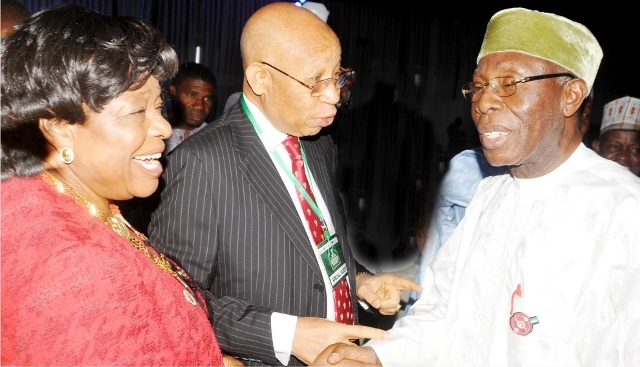Business
FG Appoints Zubair Acting SEC Boss

The Federal Government has announced the appointment of Dr Abdul Zubair as acting Director-General, Securities and Exchange Commission (SEC).
The commission’s Corporate Communications, Mrs Efe Ebelo said in a statement made available to newsmen in Lagos yesterday that the appointment was with immediate effect.
Ebelo stated that the appointment followed the suspension of Mr Munir Gwarzo, the commission’s boss.
She assured the investing public and stakeholders, both local and international, of the commission’s commitment to ensuring uninterrupted and orderly operation of the market and regulation.
Until his appointment, Zubair was the Director in charge of External Relations in the commission.
Ebelo stated that the SEC would continue to ensure the stability of the Nigerian capital market and sustain the all-time high level of investors’ confidence.
She added that recent developments in the commission would not be allowed to disrupt its regulatory effectiveness and efficiency as statutory regulator of the capital market.
She assured that the market would run smoothly despite the development.
Ebelo said the commission patiently awaited the outcome of the assignment of the Administrative Panel of Inquiry set up by the Minister of Finance to investigate the allegations against the former boss.
She said that at no point would the management allow the operational independence of the commission to be compromised.
“This is strictly in line with the objectives and principles of securities regulations as set out by the International Organisation of Securities Commissions (IOSCO), to which Nigeria is a signatory,” she said.
Ebelo said that the commission would continue to be faithful to its developmental mandates as enunciated in the Investments and Securities Act (ISA).
She added that SEC would ensure market efficiency, accountability and transparency and would proceed with all regulatory matters currently before it with.
She said the commission would do that with all sense of objectivity and fairness and with the best interest of investors.
She added: “in this regard the commission will make public its decisions on matters before it as promptly as such decisions are being arrived at.
“The role of the capital market in economic stability and growth cannot be over-emphasised, hence the commission will not at any time permit the abandonment of its regulatory and developmental responsibilities.”
It will be recalled that the Minister of Finance Mrs Kemi Adeosun, on November 29 suspended Gwarzo over allegations of financial impropriety.
Adeosun immediately set up an administrative panel of inquiry to investigate the allegations.
She said that the suspension of Gwarzo was to allow for an unhindered investigation of several allegations of financial impropriety leveled against him.
She also suspended two other senior staff of the commission: Abdulsalam Naif Habu, Head of Media Division; and Anastasia Omozele Braimoh, Head of Legal Department.
The acting director-general is an alumnus of Ahmadu Bello University, Zaria, where he received B.Sc. Economics, MBA, M.Sc. and PhD Business Administration degrees.
He also holds a PGD (Mathematics & Computer Science) and a PGD (Education) from other universities.
He has over 25-year cognate experience in the financial industry and the academia.
Business
MWUN Backs Nigeria’s Bid For IMO’s Category C Seat
Business
Food Security: FG To Review Nigerian Agric laws
Business
Okpebholo Charges Committee To End Herders, Farmers Clash In Edo … Inaugurates Boundary Committee
-
Sports2 days ago
Ekiti Honour Contingents On National AGILE Games’ Feats
-

 Nation2 days ago
Nation2 days agoNGOs Urge RSG To Prioritise Child Protection Funding
-
Politics2 days ago
LG Autonomy: ICPC Hails S’Court Decision, Decries Councils’ Funds Misuse
-

 Editorial2 days ago
Editorial2 days agoResponding To Herders’ Threat In Rivers
-
News2 days ago
Tinubu Inaugurates Institute Of Vocational Training, 100 CNG Buses In Kaduna
-

 News2 days ago
News2 days agoRSG Moves To Diversify Rivers Economy …As Farmers, Others Laud Ibas Over Implementation Of RAAMP
-
Business2 days ago
PINL Initiatives, Operational Etiquette Excites Bayelsa Stakeholders
-
Business2 days ago
MWUN Backs Nigeria’s Bid For IMO’s Category C Seat

